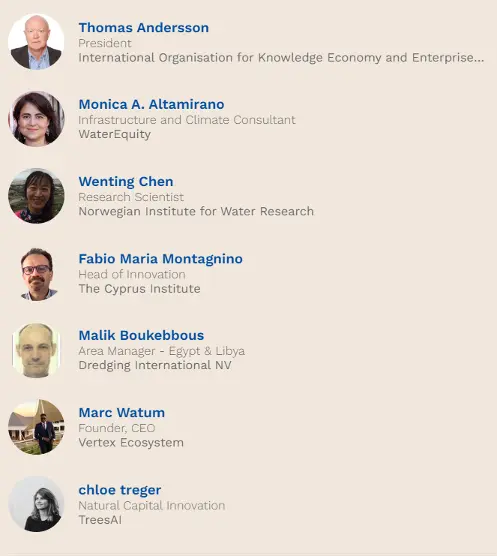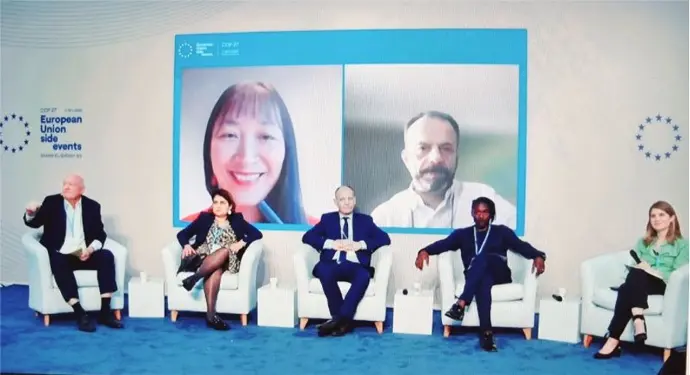The EC Task Force III EC Side Event was packed, with a strong audience on-site at the EU pavilion in the convention centre of COP27, as well as with many more taking part on-line from all around the world. The moderator, Prof. Thomas Andersson, represented the Task Force, the Horizon 2020 project URBiNAT, and served as well as co-author of the expert report “The Vital Role of Nature-based Solutions in a “Nature-Positive Economy”. In his initial remarks, he pointed to crucial challenges facing our world due to systematic under-investment in sustaining the benefits of Nature. While mobilising support for #naturebasedsolutions (NbS) stands out as increasingly critical, capturing the benefits requires realising innovative business models, the rise of viable #naturebasedenterprises (NBEs), and that the financial sector is energised for greatly enhanced and more relevant investment. While no single-handedly uniform recipe is at hand, the session highlighted valuable lessons of intensive experimentation and learning processes across cities in Europe and elsewhere, made possible by the Task Force. Working out a way forward, with a just transition to a #naturepositiveeconomy, enabling further diffusion and enhanced relevance on the ground, in cities around the world, will require further deepened and expanded genuine collaboration, with joint efforts cross-borders.
In the ensuing presentations, the audience and speakers stressed the need of accelerated action on the policy front as well as in regard to piloting and actions on the ground. While two of the speakers brought additional experiences and insight from the work of the Task Force, external academic and industry representatives added complementary vital perspectives.
Throughout the session, constructive efforts were made to demonstrate viable business cases drawing on NBS, while candidly exposing outstanding issues and barriers.
Highlights of the various contributions:
* A moving address by the South African entrepreneur Marc Watum, the founder of the pan-African 2030 initiative, calling attention to the complex and contradictory state of our world. He underlined the importance of unlocking our mindset and recognising the age-old knowledge of local communities as part of a way forward to harness the value of nature, instead of undermining and depleting it.
* Wenting Chen elaborated the spectrum of benefits arising from NbS, while noting that some can be monetised and internalised, while others can not. On this basis, she called for further development of methods of value-accounting and their embedding in institutional frameworks on terms that can help realize greater investment and support of key, endangered resources,
* Speaking on behalf of an established corporation, DEME, one of the world’s largest dredging companies that know how to engineer ocean and coast-land projects, Malik Boukebbous presented an informative and fascinating exposé of the many pits and pieces that need to match with genuine stakeholder engagement, aggregated, and coordinated, in order to realise large-scale NbS projects. He pointed to the rapid evolution in financial markets as offering critical means of enabling greater progress
* Mónica A. Altamirano de Jong, PhD de Jong, PhD similarly pointed to a range of successful projects as well as readily available untapped opportunities to achieve more. She demonstrated that lack of progress is not primarily due to lack of funding but lack of capacity to put forward bankable projects. She called for a rethinking on collective action approaches to public-private partnership.
* Chloe Treger from TreesAI used the example of an ongoing pilot in #Glasgow to show how platforms can play an important role in connecting local partners and projects with financing (delighted to see our partner and friend @GlasgowCityCouncil involved in this pilot.). She underlined the importance of innovation in making use of new technologies to overcome coordination problems and achieve better matching between project opportunities and providers of funding and other resources.


* Finally, Fabio Maria Montagnino from The Cyprus Institute outlined the problematic situation across much of the Eastern Mediterranean and the Middle East in the face of high risks from climate-related challenges. He made a compelling case for the need of overcoming current fragmentation in communication and approaches through the establishment of candid, constructive collaboration on where it matters most. He ended with a thought-provoking reflection how nature is on the line, calling for our enhanced efforts for us all to face up the distorted choices and pressures which currently causes the downfall of nature at the altar of economic development. The session ended with a series of questions from the audience and a brief debate which, among other things, inquired about the kinds of benefits emanating from NbS, and how they may or may not materialise in the specific case. The panellists concluded with brief remarks what they viewed as most important for turning the tide and achieving better progress ahead. The answers included both a call to improved and more enabling polies, and the need of intensified and expanded piloting, experimentation and learning from below, as we can no longer wait for governments. Thomas Andersson expressed hope that the session could inspire enhanced collaboration to identify ways forward, and by thanking the speakers and all who had taken part and made the session possible.
Huge thanks to @ClaireKwiatkowski European Research Executive Agency (REA) for strong engagement in organising this session and to all members of the European Commission Taskforce III collaborating on financing and business models for #naturebasedsolutions

